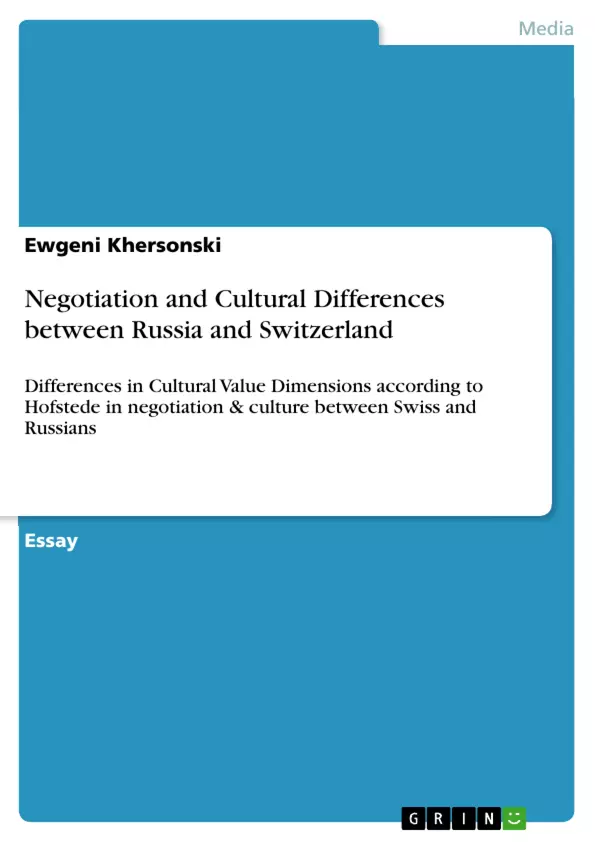This essay reflects differences in culture and negotiation between Russia and Switzerland. According to Hofstede´s value dimensions, main differences are shown and explained in a very deep way of historical background.
Furthermore, this masterpiece is giving recommendations for Russian business people in terms of their negotiation tactic, preparation and behaviour in Switzerland during negotiations.
Inhaltsverzeichnis (Table of Contents)
- Introduction
- Cultural Differences
- Differences in the 'Power Distance' Dimension
- Differences in 'Uncertainty Avoidance' Dimension
- Differences in the Masculinity vs. Femininity' Dimension
- Differences in 'Distributive Negotiation' and 'Integrative Negotiation'
- Advice for Russians, negotiating in Switzerland
Zielsetzung und Themenschwerpunkte (Objectives and Key Themes)
This essay aims to explore the impact of cultural differences between Russia and Switzerland on the negotiation process, particularly in business contexts. It provides guidance for Russian negotiators embarking on negotiations in Switzerland, highlighting the importance of adapting negotiation styles to cultural norms.
- Cultural differences between Russia and Switzerland
- The impact of cultural dimensions like power distance, uncertainty avoidance, and masculinity on negotiation styles
- Distributive versus integrative negotiation approaches in Russia and Switzerland
- Practical advice for Russian negotiators in Switzerland, focusing on cultural sensitivity, relationship building, and negotiation strategies
- The importance of understanding cultural nuances in international business negotiations
Zusammenfassung der Kapitel (Chapter Summaries)
The essay begins by outlining the general concept of culture and its significance in international negotiations. It then contrasts the cultural differences between Russia and Switzerland, focusing on key dimensions like power distance, uncertainty avoidance, and masculinity. The essay emphasizes the impact of these differences on negotiation styles, particularly contrasting the distributive approach prevalent in Russia with the integrative approach preferred in Switzerland. Finally, it provides practical advice for Russian negotiators working in Switzerland, emphasizing the importance of cultural sensitivity, relationship building, and understanding Swiss negotiation strategies.
Schlüsselwörter (Keywords)
The essay focuses on key concepts such as cultural differences, negotiation styles, power distance, uncertainty avoidance, masculinity, distributive negotiation, integrative negotiation, Russian culture, Swiss culture, international business negotiations, and cross-cultural communication. It explores the influence of these elements on successful business negotiations between Russian and Swiss parties.
Frequently Asked Questions
What are the main cultural differences between Russia and Switzerland in business?
The differences are primarily found in dimensions like power distance, uncertainty avoidance, and masculinity/femininity, which affect how decisions are made and relationships are built.
How does "Power Distance" affect Russian business negotiations?
Russia generally has a higher power distance, meaning hierarchy and the authority of top leaders play a much more central role than in flatter Swiss organizational structures.
What is the difference between distributive and integrative negotiation?
Distributive negotiation is often "win-lose" (common in Russia), while integrative negotiation focuses on "win-win" solutions and mutual benefit (preferred in Switzerland).
What advice is given to Russians negotiating in Switzerland?
Russians are advised to adapt to a more egalitarian style, focus on long-term relationship building, and understand the Swiss preference for detailed preparation and consensus.
Why is Hofstede’s model used in this analysis?
Hofstede’s value dimensions provide a scientific framework to compare cultural norms and explain why certain negotiation behaviors are more effective in one country than the other.
- Quote paper
- Ewgeni Khersonski (Author), 2009, Negotiation and Cultural Differences between Russia and Switzerland, Munich, GRIN Verlag, https://www.grin.com/document/139501



